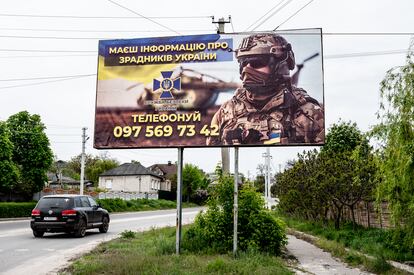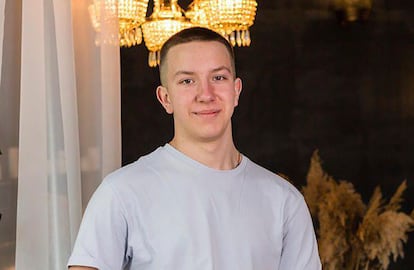Young Ukrainians leave the country to avoid going to war
Under Ukraine’s martial law, men aged 18-60 who are eligible for military service must stay at home, but many are leaving before reaching that age


During Russia’s full-scale invasion of Ukraine in February 2022, 18-year-old Oleg Strelets said he experienced psychological distress and struggled with sleep. “I was stressed out because I thought the war might come here,” he said. Strelets, who was underage at the time, lived with his family on the outskirts of Kyiv when Russian troops were threatening the capital. In March 2022, he left the country for the first time and went to Poland. He returned home when the situation stabilized and the Russians withdrew from his city. Less than a year later, Strelets, a student and musical composer, left for Krakow (Poland) and never came back. He’s over 18 now and legally eligible for military service. Many other 18-year-old Ukrainians are also trying to avoid conscription and have left to build new lives away from the war.
Under Ukraine’s martial law, men aged 18-60 who are deemed fit for combat are restricted from leaving the country. However, there are some exemptions: having three or more children, holding a military disability certificate, having dependents to care for, or being a higher education student living abroad. Strelets, a curly-haired young man with a pointy goatee, has none of these exemptions and readily admits he was unprepared for war, unlike some of his friends who are willing to go fight on the front lines. “I was really afraid, you know?” he tells us in a video call from Krakow. “It was sad coming to Poland, but I just wasn’t ready to stay.”
However, it was ultimately his parents, who are from the Donbas (eastern Ukraine) region, who made the decision. During the initial weeks of the invasion, Strelets’ parents prohibited him from going outside. He had loud and heated arguments with his mother until she firmly told him to go to Poland. Strelets now lives with a woman and her two children. He gets help from his parents and the Polish government because of his refugee status, although progress on the latter is slow. “If the war ends or if I don’t feel right in Poland, I’ll just head back home,” he said. But he also repeated that he wouldn’t pick up a rifle.
A year and a half after the invasion, the Ukrainian trenches are populated by professional soldiers and volunteers. Martial law allows for the draft, but recruitment drives have been successful enough to obviate the need for mandatory conscription. The intensity of the Russian offensive, especially in provinces like Kharkov, along with the demands of the Ukrainian counteroffensive in Zaporizhzhia and Kherson, suggest that Kyiv will need additional recruits in the near future. However, this could be challenging considering Russia’s population advantage of 100 million over Ukraine. Official statistics indicate that over 200,000 Ukrainian boys will turn 18 this year.

Radion will reach legal age next year. The tall young man has a plan — he wants to study in Ukraine. “But before I turn 18, I’ll see what the situation is, and if [the war] keeps going like this, I might head to Europe, maybe even Berlin.” Radion chooses not to disclose his last name as a precaution because he is strongly critical of how the war is being conducted. “I’ve heard lots of stories, and I know I’ll die if I’m sent to the front lines.”
Radion might not be aware, but on August 7, the Ukrainian Parliament began discussing a law that could potentially bar young people aged 16-18 from crossing the nation’s borders without an authorized adult. The purpose of this law is to protect them from possible exploitation. If Radion chooses to stay, his plan is to attend the prestigious Kyiv National University-Mohyla Academy and study ecology. Although not initially passionate about the subject, his perspective has gradually changed over time. The youngest in his family, Radion comes from Krivoy Rog, the city in central Ukraine where President Zelenskiy was born. “At first, I believed what the government was saying, that we were beating the Russians, you know? But now, I think they’re just killing each other. I mean, I’m not saying that everything is propaganda, but maybe, like, 80% of what they say...” He says his friends share his way of thinking.
Corruption
Radion has another way of fighting the Russian invaders. He openly admits to engaging in a profitable scam using social media to trick Russian soldiers into cryptocurrency investments. He and other young people haven’t lost respect for those serving on the frontlines because of their profession or sense of duty. Nonetheless, there is no shortage of people looking to avoid enlistment, even if it means paying for it. In response, the Ukrainian president has recently ordered the immediate removal of all regional recruitment chiefs, in light of 112 cases of potential corruption where recruits offer bribes to military officials who declare them unfit for service so they can leave the country.
Bogdan is almost 17 and just completed high school. He has already applied to a police academy, following in his mother’s footsteps. “I want to understand the law and know how to apply it in different scenarios,” he said in a phone conversation from Krivoy Rog. At one point, he considered volunteering for military service, but now he prefers to serve by joining the police force, even if it means being stationed on the border with Russia. Becoming a police officer would exempt him from being called up for military service.
A serious young man who seems more mature than his age, he also feels what many young people are saying — things are not going well in the war. “I don’t want to go because there are so many people who have gone and died,” he said. Only one of his friends is interested in joining, but is unable to due to a health condition. “A lot of people want to leave [the country] before they’re 18, or they want to keep studying,” he said.

Heading southwest from the center of Kyiv, city streets quickly give way to green countryside. On the porch of a charming country house in the Petropavlivska municipality, we find Dmitro Ivanov, a 19-year-old musical prodigy who has mastered the piano and several other instruments. As he talks, his fingers gracefully dance along the keys. The mere thought of joining the army seems utterly alien to him, evoking a hearty chuckle. “I’m not afraid of being recruited,” he said, “because I trust that they won’t do it because of my musician status.” But that is not a qualified exemption under Ukraine’s martial law.
Dmitro was born in Sumy, in the northeast, close to the Russian border, but grew up in various cities like Mykolaiv and Lviv. He shares a story about a time when he unintentionally violated the curfew and found himself at the police station. He heard police talking to other young men about joining the military. “But they didn’t even ask me because I look like I’m 15,” he recalls amused. Then his face turns serious. “We are free human beings, and they can’t force us to go to war,” he said, “and if I want to make music, then let me make music.” Dmitro does not believe in this war. “It is just business,” he says in English. It’s all about business, but Dmitro doesn’t mind other people going to war. “But when the government tries to manipulate your mind and make you pick up a weapon, that really makes me angry.”
Sign up for our weekly newsletter to get more English-language news coverage from EL PAÍS USA Edition
Tu suscripción se está usando en otro dispositivo
¿Quieres añadir otro usuario a tu suscripción?
Si continúas leyendo en este dispositivo, no se podrá leer en el otro.
FlechaTu suscripción se está usando en otro dispositivo y solo puedes acceder a EL PAÍS desde un dispositivo a la vez.
Si quieres compartir tu cuenta, cambia tu suscripción a la modalidad Premium, así podrás añadir otro usuario. Cada uno accederá con su propia cuenta de email, lo que os permitirá personalizar vuestra experiencia en EL PAÍS.
¿Tienes una suscripción de empresa? Accede aquí para contratar más cuentas.
En el caso de no saber quién está usando tu cuenta, te recomendamos cambiar tu contraseña aquí.
Si decides continuar compartiendo tu cuenta, este mensaje se mostrará en tu dispositivo y en el de la otra persona que está usando tu cuenta de forma indefinida, afectando a tu experiencia de lectura. Puedes consultar aquí los términos y condiciones de la suscripción digital.








































